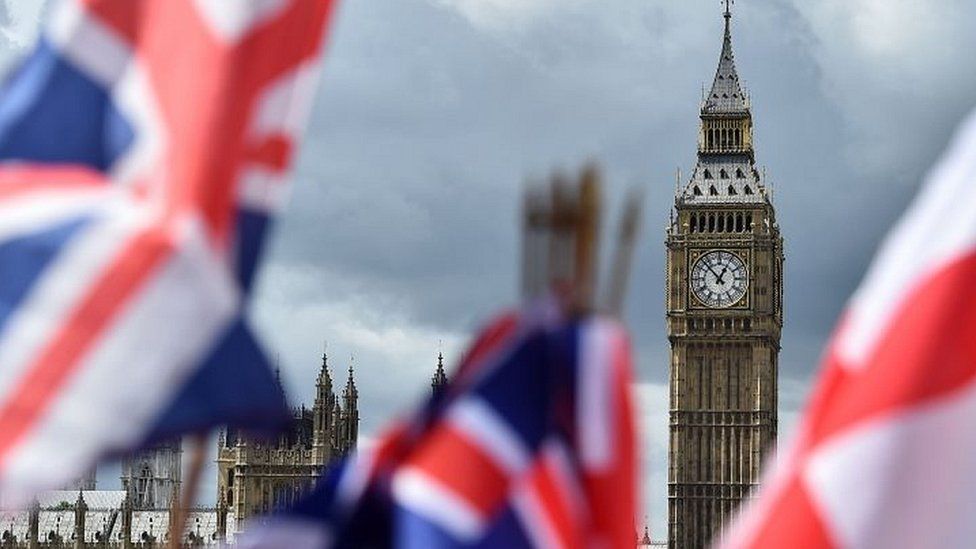Will Theresa May now have to change Brexit plans?
- Published

Enthusiastic Remainers have been quick to jump on the election result as their latest opportunity to mould the UK's departure from the EU.
The various lobby groups, including former ministers still close to some in government, have been whirring with chatter and tactical planning about how to get their voices heard. There are ideas about commissions or "neddies" - groups of advisers from business and all political parties that met in years gone by.
Even senior Tories like the leader of the Scottish Conservatives, one of their few success stories at the moment, told us yesterday: "It can't just be a Tory Brexit." On first hearing, that is a staggering thing to hear from Tory lips.
But before Remainers get swept up in their moment, and their ambitions swell, it's worth pondering what possibly might be on the table - and what might not - given the usual caveats about the unpredictability of what might come next.
First off, even Brexit-supporting ministers involved in the process acknowledge that a minority government has to behave differently. Expect therefore a change in tone, a more overtly consensual approach; the government is, for example, more likely to agree opposition attempts to amend its EU legislation without a fight.
One cabinet minister told me the government will take a less ideological approach. Some members of cabinet will push for a less rigid stance, urging Theresa May to soften or scrub out her red lines, as the negotiations get under way.
But on the fundamental choices? Two well-placed ministers tell me it's hard to see, "hard to go back on" the decision that we are leaving the single market. It is likely the government will make more of trying to maximise our access to it. This could mean it will become an equal concern to immigration rather than being a clear rhetorical second.
But inasmuch as it is at all possible to take direct readings from the electoral message (and I'm not sure it is given how varied the results were), more than 80% of the public voted for the two main parties, who both promised to leave the single market and end free movement. Woe betide any politician in this climate who is suddenly going to tell the electorate they didn't mean it on immigration.
There are hopes in the Remain camp too about the influence of the DUP; their participation in government does not mean suddenly that the government's Brexit plan changes dramatically.
While the DUP have their own particular view on Brexit with concern about customs arrangements, they are not "soft" Brexiteers who will try to water down the whole thing.
They were involved as a party in the Vote Leave campaign and while they will push their strong view on the border and customs arrangement, they are not suddenly going to be arguing for only a tiny loosening of the links.
It is worth remembering too that even with the DUP and this week's promises of support, having been cut down to size, Theresa May is even more vulnerable to her powerful Eurosceptic backbenchers than before the election. The arithmetic means she has to listen to other parties more, but she also has less ballast to fend off her own MPs. One former minister told me "it'd only take me and a couple of my mates to defeat her".
It is easy to argue today for a grand-sounding Brexit Commission to bring all parties in. It could be a political tool for Theresa May to form a mechanism for appearing to be listening to all. The idea is not quite being denied or really encouraged in government. And insiders are well aware of how such ideas can prove pointless.
There is already, for example, the committee that's meant to discuss the Brexit situation for the four nations. Few people who have been close to that process argue it's achieved much at all. And years of arguing for an NHS commission haven't got far at all. The government, although it was considered by David Cameron, did not in the end, trust Labour enough to take up the call.
Theresa May doesn't trust easily. It wouldn't really be in keeping with her style to dramatically reach out to the other parties in a formal way. In truth it is also not that clear the Labour leadership would really want that kind of role.
But the reality of the parliamentary numbers means she is forced to take other opinions into consideration, or her government falls. There will no doubt be arguments about how it's done, whether a new process is introduced or not. It is just as likely the government and opposition whips are about to get to know each other much much better.
But "cross-party working" - otherwise known as clipping your wings - however it's done, will be a feature of life under Mrs May. Remember she is not just more vulnerable to the opposition, but on her own side too.